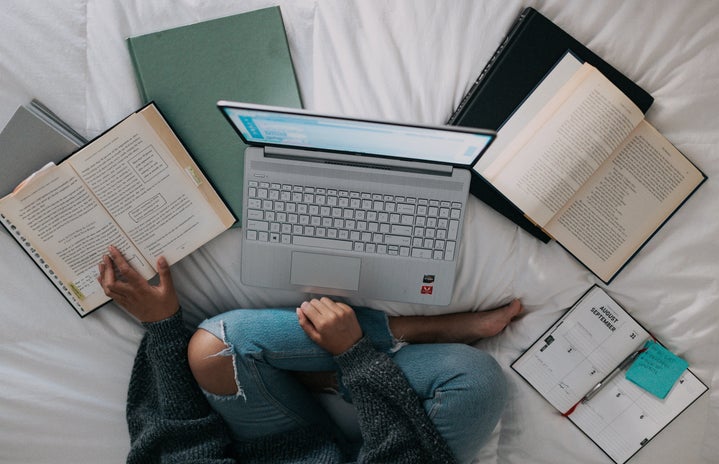Academic excellence is one of the most rewarding and draining feelings in a student’s life. The constant pressure to be the smartest and most knowledgeable for each exam, final, or even quiz can drain someone’s mental well-being. Throughout my life, I have found my worth dictated by what score I got on my statistics final or English paper. My worst score would always make me feel more than any good score I could have received, and I knew it was time for a change.
Once I let go of academic excellence and found a sense of self-confidence outside of a good grade, I found study habits and methods to help me feel confident in my prep for any exam. I had to let go of the worth found in good exam grades and instead found worth in my drive to complete my goals.
Find Your Learning Type
According to The Washington Post, only 20-30% of students know how to study effectively. Studying for exams or quizzes can feel taxing and hard, especially when you do not know how you study best. The first step to creating healthy study habits is to figure out what type of learning is most effective for you. Online there are many different free quizzes to help you identify the best study tips and learning habits that work best for your personality type.
After taking these quizzes and identifying what your brain needs to study efficiently, you can use this information to pinpoint the exact study habits that allow you to retain the needed material for those finals. When I did not know my learning type, I struggled constantly with what study habits were right for me. In high school, I never worried much about studying because school and my future were never at the front of my mind. After finding passions and goals for my future in nursing, I soon realized I never learned how I should be studying.
After completing personality quizzes online to help me identify what learning habits would work best for me, I found that repetition over longer periods of time was my best method. The most important step to studying better is to find your own personal learning type, despite what another person says about another study habit. Every person is different in the way they process information, so finding the way you study best is the first step to studying better.
The Blurting Method
After identifying what learning method works best for you, the next step is to find a study habit that coincides with that method. One of my favorite and most beneficial study habits is the blurting method. As a nursing major, I deal with lots of material that requires lots of active recall to help me remember everything. A particular course that has been one of my hardest yet is anatomy. At the beginning of this year, I found that my usual cram the night before the exam method did not work for this course, and I might need to try a different habit. I needed to come up with a better study plan for the next exam or I was not going to survive this course. This is when I found my learning type and discovered time management and repetition were what I was missing in my study plan.
The blurting method is a combination of repetition over a longer period of time. This method calls for a week of studying before your exam, depending on how much material is on it. You first take it module by module and do notes on each. After taking notes, you will try to recall and write as much as you can from what you can remember from those module notes. The fast recall can help you identify what stuck from those notes and what you still need to work on. Splitting up each module and doing these notes with fast recall can help you not feel as overwhelmed by having to learn so much material in such little time.
Objectives, Objectives, And Objectives
The study habit that has helped me the most in my college experience is remembering the importance of objectives. Most teachers will not provide a study guide simply because they have put objectives on each module slideshow to learn. I looked over the critical importance of these objectives simply because I was too upset that the professor did not hand me a list of everything I needed to know for the exam.
One study method I found for myself was to create my own filled-out study guide for everything I needed to know. This method forced me to go through each slideshow and find the objectives I needed to know. In nursing classes especially, not one teacher has given me a nicely made study guide filled with every answer and objective I needed for that upcoming exam. As much as I hated not having everything done for me (I mean, who wouldn’t?), this forced me to make one myself, which helped me do well on my exams in the long run.
Once I made a study guide and started filling it out as the weeks went before my next exam, I found that my test anxiety lowered and my grade percentages went higher.
The Power of Handwriting
One thing people tend to forget about being constantly surrounded by technology at all times is the importance of handwritten notes. It is scientifically proven that the act of actually writing out your notes instead of typing everything is way more beneficial in remembering the notes themselves.
When typing notes out, you are more likely to have lower retention of the material. Instead of typing out notes for your next unit, try switching to a pen and a notebook and do a self-experiment to see which notes you can recall better. I switched to handwriting and drawing all of my anatomy notes in combination with fast recall, and quickly saw better results on my next exam.
The Scribble Method
One study habit that has brought me a fair share of crazy looks in the library is the scribble method. This technique I learned from an endless scroll on TikTok one day is the process of reading through your notes and simultaneously scribbling on a piece of paper next to you. I know this seems silly, but I have found that on the night before my exam, this method helps me force myself to go through all my notes and retain them. For me, this method works best when I’m doing a last-minute read and “write” through all my notes to help me retain anything I still need to memorize.
While this method may seem a little out there, this method has helped me to force myself to go through my notes one last time before my exam. This method has not been scientifically proven, but from my experience, it is helpful when I need that quick cram the night or day of an exam.
Finding What Works For You
Studying and note-taking can seem like a daunting task if you don’t know the way that works best for you. Finding what works for you is no small task, and it’s hard to keep up if you do not put in the work. My study habits never came naturally to me, even in my freshman year of college. All throughout high school I struggled to find a way to retain information from my classes and eventually gave up.
High school classes love to teach you tons of material like math, English, history, and science, but never how to make all of the material stick. As someone who struggled to learn how to study, I know firsthand how isolating it is to be around everyone who seems to know everything for each exam.
After feeling like I was in a constant cycle of not properly studying, exam after exam, I finally found the techniques that worked for me and a new found confidence in my academic abilities.


